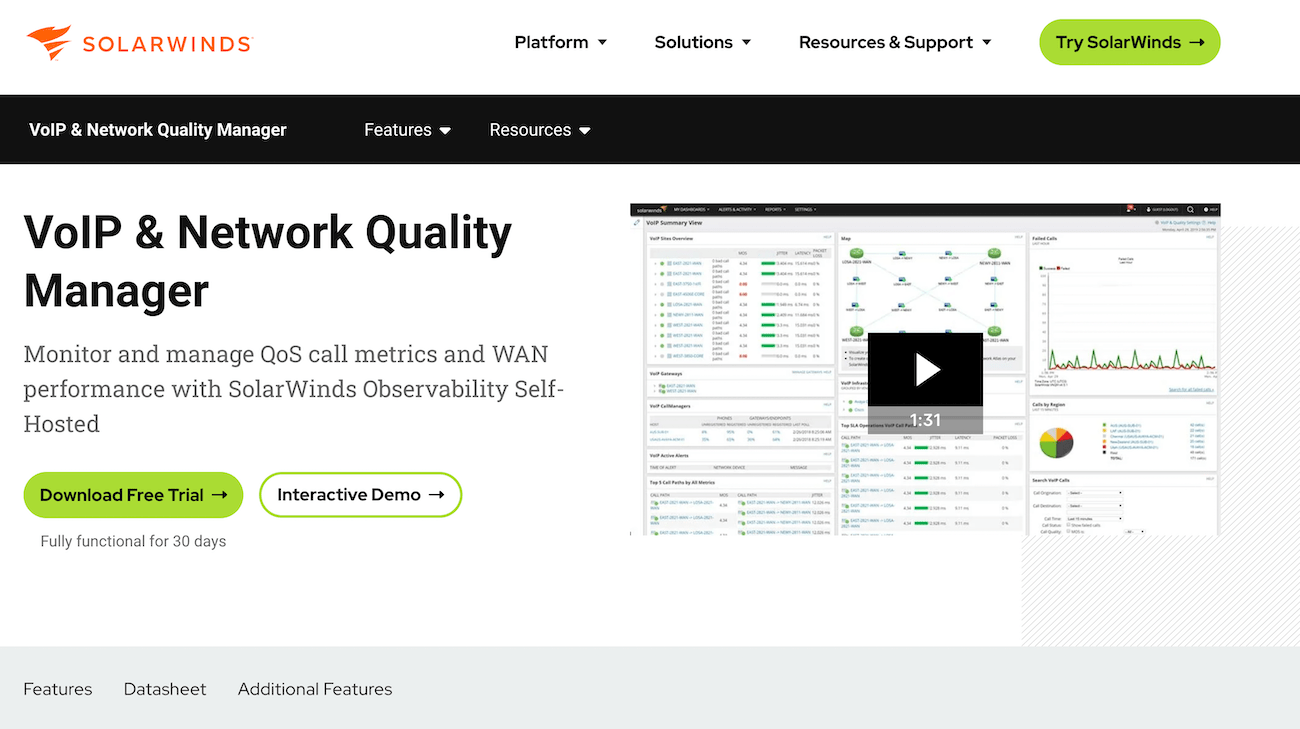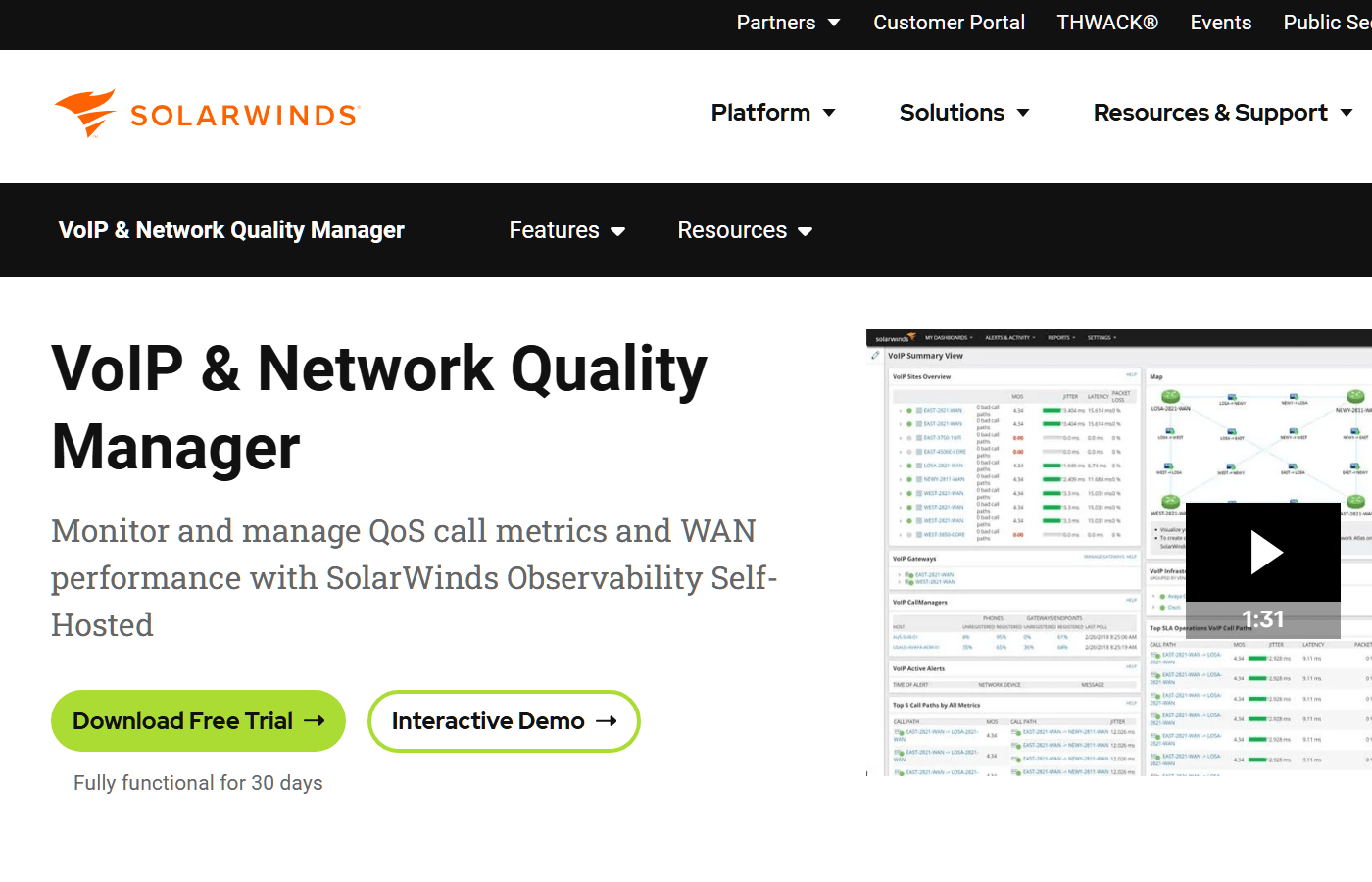A VoIP quality test measures the performance of your network connection. The test simulates a set number of calls on your network and uses key metrics to determine how calls would sound in different situations.
It can help you understand whether your connection is strong enough before implementing a VoIP system and alert you to potential post deployment issues as well.
Mean opinion score (MOS) is an industry standard metric for VoIP call quality — it’s a simple 1-5 rating system with 1 being the worst and 5 being the best.
Anything above a 4 is sufficient and scores below 3.5 should be considered unacceptable. Below that range, users are more likely to experience mic echo, dropped calls, choppy or robotic sounds, and cutting out.
This guide covers everything you need to know to perform VoIP tests and tweak settings to optimize for MOS.
What a VoIP quality test measures
Before we dive into how to run a VoIP quality test, it’s important to understand what metrics you’ll get back and what they mean.
Every VoIP test is different, but most measure things like:
- Upload and download speed — Measures how fast data packets can move through your network. In general, the higher the speed, the better the quality.
- Bandwidth — The maximum amount of data that can be transmitted across your network. It directly impacts the number of simultaneous calls you can have before quality takes a nose dive.
- Jitter — Variations between sent and received data packets. If these variations are significant, users might miss entire words or sentences during the call.
- Latency (or ping) — Measures the delay from one caller to another. High latency is often caused by network congestion and results in echoing.
- Packet loss — Refers to data packets that never reach their final destination. If it exceeds 1%, calls will likely have choppy audio and other distortions.
Many will also let you simulate calls with different VoIP codecs. This is a parameter that defines how much compression happens during a call. More compression makes packets smaller, resulting in faster transmissions and reduced network congestion.
But too much compression can lower audio quality to the point it’s unrecognizable. The key is finding a good balance that works for your team.
Lastly, some of the better VoIP quality tests calculate your MOS by factoring in all of these elements and metrics.
It’s also worth noting that some tools let you run tests for different numbers of simultaneous calls, and you may even be able to change the origin location of the call.
As you adjust different parameters and variables, you may get a different MOS. For example, you might have a perfect score right next to your router but a lower score if you’re on the other side of the building.
SEE: Learn how to optimize your VoIP network.
How to run a VoIP quality test
There are dozens of tools that let you test VoIP quality.
To keep it simple, I’ll show you how to do it in just a few minutes for free, and what to use if you’re a developer or need more granular insights.
Free online VoIP quality tests
Many business phone providers have their own online VoIP quality tests you can use for free. They’re very easy and quick, making them perfect if you’re not quite sure what’s going on and just need a simple way to tell if your network is stable enough.
Most measure latency, jitter, upload speed, and download speed. Some (but not all) also measure packet loss and calculate your MOS.
RingCentral’s quality of service test is one of the best free options I’ve seen.
The best part about this test is that it gives you MOS. It also measures packet loss, latency, and jitter in your audit summary.
Another standout of RingCentral’s test is the ability to adjust your codec. You can also test up to 50 simultaneous calls and run the test for up to five minutes — the longer you test, the better chance you have of finding an issue.
Once the test is finished, it does a good job of explaining what all the numbers mean and whether or not your connection passes.
It’s also about as easy as it gets to run. All you have to do is select your preferred number of concurrent calls, adjust the duration, and tweak the codec if you want.
While RingCentral’s is one of the most detailed free options, there are others you can use to validate your results if you’d like.
There are other VoIP quality tests on the market that you can use, and it might be a good idea to try multiple to see if you get consistent results across the board. Here are some others worth checking out:
- Nextiva’s test — Simple option for testing up to 200 simultaneous calls.
- Ooma’s test — Easy way to check latency, jitter, upload, and download speed.
- 8×8’s test — Similar to Ooma, but lets you change the host.
Overall, RingCentral’s is the most detailed, but these other free VoIP quality tests can give you more data points to ensure accuracy.
SEE: Learn more about our favorite VoIP providers: RingCentral review | Nextiva review | Ooma review | 8×8 review.
Network monitoring software (paid with a free trial)
Network monitoring software is typically used by IT network administrators to ensure their network is running smoothly. It’s also useful for identifying issues with various components (routers, servers, firewalls, switches, etc.).
You can also use them for testing VoIP network quality, and they provide far more detailed information than any of the free tools out there.
SolarWinds VoIP network quality manager is one of the best. Instead of one-off tests every now and then, it runs continuously in the background.

Although SolarWinds isn’t free, there is a 30-day free trial. You can test your network for a full month to see how its performance changes over time. From there, you can decide if you want to keep using it.
Beyond basic VoIP quality stats, it also provides WAN performance metrics. It also provides contextual information related to performance issues.
For example, you can see the specific IP addresses of devices that are causing jitter, latency, or packet loss. This will help you determine if call quality issues are related to hardware on your network or something else.
The software does a whole lot more than that, but it’s a great alternative if you need real-time data or more data points to understand and improve your MOS.





